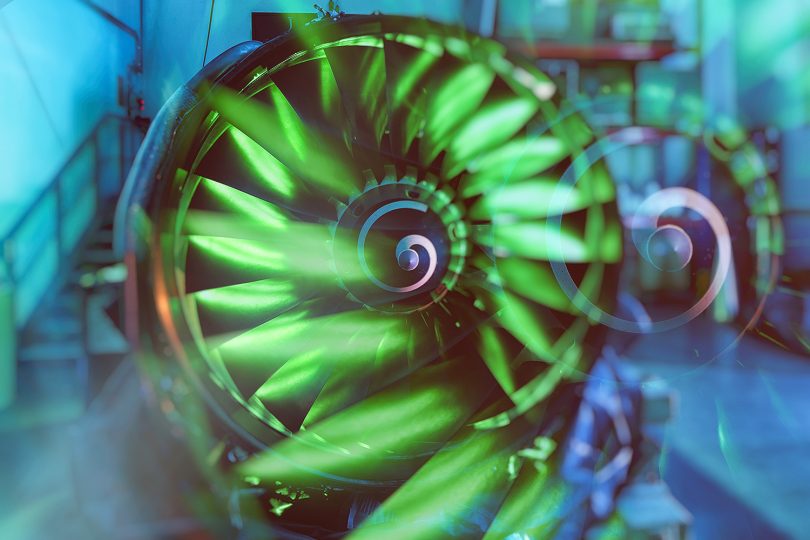“A firm place on the aviation map” Science Minister Mohrs visits aviation excellence cluster
On 12 April 2024, Falko Mohrs was a guest at Braunschweig Research Airport. At the Institute of Jet Propulsion and Turbomachinery, he was able to see the progress being made by the SE²A Cluster of Excellence in sustainable aviation. The programme included current research highlights such as progress in reducing drag through laminar support, active load reduction in flight and new results on electric propulsion. The programme also included a tour of the laboratories and test beds, including innovative distributed propeller drives. SE²A spokesperson Professor Jens Friedrichs emphasised the importance of the cluster’s interdisciplinary research approach. This is the only way to make real progress for the flying of tomorrow. The Technical University of Braunschweig is currently preparing an application to continue the cluster.
Aviation and mobility research and sustainability are key topics at TU Braunschweig. “Making air transport efficient and ecologically sustainable – these are enormous challenges we face worldwide. There is probably no other means of transport that consumes more energy than flying. In the SE²A Cluster of Excellence, scientists from various disciplines are working together to research technologies for the environmentally friendly development of air transport for society and industry. The aim is to find pragmatic solutions that can be implemented. The infrastructure created here and the interdisciplinary cooperation between the research partners have put Braunschweig firmly on the aviation map. We want to emphatically support this path,” said Falko Mohrs after his visit to Braunschweig.
Angela Ittel, President of TU Braunschweig, added: “It is precisely this first-class quality that distinguishes our cluster. We have the highest standards in terms of research output, transfer, sustainability and international cooperation. We do excellent basic research here and at the same time work on realisable, pragmatic and practical solutions. This innovative strength is enormously inspiring and that is why we definitely want to continue our work in the next round of excellence clusters. Many thanks to the state for its great support”.
The “SE²A – Sustainable and Energy Efficient Aviation” research project addresses the challenge of making future air transport efficient while meeting the competing demands of continuous growth and environmental sustainability. Scientists from the fields of aeronautics, electrical engineering, energy research and design are aiming to drastically reduce energy consumption and emissions from aircraft, reduce noise pollution, develop an adapted air traffic management system and carry out a holistic assessment in terms of resource consumption and climate impact.
Professor Jens Friedrichs, spokesman for the SE²A cluster: “Achieving greater sustainability in the aviation industry is a huge challenge. We are very proud that, since the start of the cluster in 2019, we have been able to achieve a large number of research results that represent a significant step forward in the regional and medium-haul sector. Outstanding examples include active resistance and load minimisation, as well as the latest results on power density of electric motors and power electronics. Accordingly, we intend to continue research into sustainable flying with a focus on long-haul flights. There is still a significant number of problems to be solved here, as many medium-haul approaches are not transferable and therefore new, sometimes radical, solutions are needed for future long-haul flights”.
The work of the cluster is based on a large number of experts working together across different disciplines. Dr Doris Pester, managing director of the cluster: “More than 60 scientists are working here at SE²A. That’s an enormous amount of manpower for a research project. Thanks to a sophisticated programme to promote young talent, the cluster benefits from outstanding national and international scientists in the early stages of their careers – something that cannot be taken for granted these days.
Internationalisation and world-class infrastructure
In recent years, the internationalisation of research work has been expanded through new collaborations. For example, SE²A works closely with leading European aeronautics research centres such as Delft University of Technology in the Netherlands and the Institut Supérieur de l’Aéronautique et de l’Espace (ISAE-SUPAERO) in Toulouse, France.
In addition to a reliable network, an optimised infrastructure also contributes to success. SE²A has access to a number of large research facilities in Hannover and Braunschweig, some of which are newly installed and approved. These include the 5-axis CNC travelling column milling machine “GroFratil”, which offers new production capabilities and thus expanded experimental opportunities for research into new wing models, flight propulsion systems and their interaction.
To ensure that efficiency and the strict reliability requirements of air traffic can be taken into account directly during development, the cluster is receiving a new laboratory, the Electric Aircraft Ground Lab Environment (E2AGLE), at a cost of three million euros.

